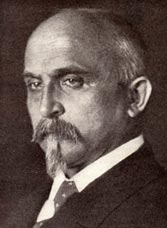
Alois Rašín
Encyclopedia

Economist
An economist is a professional in the social science discipline of economics. The individual may also study, develop, and apply theories and concepts from economics and write about economic policy...
and politician
Politician
A politician, political leader, or political figure is an individual who is involved in influencing public policy and decision making...
.
Rašín was born into a family of farmers. After gymnasium he continued his schooling with the study of law at the Charles University in Prague
Charles University in Prague
Charles University in Prague is the oldest and largest university in the Czech Republic. Founded in 1348, it was the first university in Central Europe and is also considered the earliest German university...
. Here he became active in politics, and a leader in the radical students movement. In the Omladina Trial
Omladina Trial
In 1894, the Omladina Trial, convened in the Austro-Hungarian regional capital of Prague, ostensibly placed Czech Anarchism and Anarcho-syndicalism before the court as well as specifically convicting 68 Czech Nationalists of radical activities....
(an 1894 trial against radical Czech youths), he was sentenced to two years in prison. Rašín continued his political activity although he became less radical over time. In 1911, he was elected into the parliament of the Austrian monarchy. After the start of World War I
World War I
World War I , which was predominantly called the World War or the Great War from its occurrence until 1939, and the First World War or World War I thereafter, was a major war centred in Europe that began on 28 July 1914 and lasted until 11 November 1918...
Rašín supported the Czech separatist movement. In 1915, he was imprisoned and sentenced to death (together with Karel Kramář
Karel Kramár
Karel Kramář was a Czech politician.- Biography :Leader of the Young Czech Party in Austria-Hungary and later of the National Democratic Party in Czechoslovakia...
). With the death of emperor Franz Jozeph I
Franz Joseph I of Austria
Franz Joseph I or Francis Joseph I was Emperor of Austria, King of Bohemia, King of Croatia, Apostolic King of Hungary, King of Galicia and Lodomeria and Grand Duke of Cracow from 1848 until his death in 1916.In the December of 1848, Emperor Ferdinand I of Austria abdicated the throne as part of...
his sentence was commuted and in 1917 Rašín received amnesty. He immediately returned to politics.
In 1918, Rašín and others organised the establishment of Czechoslovakia
Czechoslovakia
Czechoslovakia or Czecho-Slovakia was a sovereign state in Central Europe which existed from October 1918, when it declared its independence from the Austro-Hungarian Empire, until 1992...
as independent state. From 1918-19, he was the first Finance Minister of the new state. At this position he managed to stabilize the currency and avoid inflation that was damaging neighbouring countries. His authoritative and uncompromising behaviour helped him to achieve his aims but generated lot of animosity.
In 1922, Rašín again became Minister of Finance in the government of Antonín Švehla
Antonín Švehla
Antonín Švehla was a Czechoslovakian politician. He served three terms as the prime minister of Czechoslovakia. He is regarded as one of the most important political figures of the First Czechoslovak Republic; he was the leader of the Agrarian Party, which was dominant within the Pětka, which was...
. Amidst an economic crisis he stressed the politics of deflation
Deflation (economics)
In economics, deflation is a decrease in the general price level of goods and services. Deflation occurs when the inflation rate falls below 0% . This should not be confused with disinflation, a slow-down in the inflation rate...
(in 1922 prices dropped by 42%, salaries by 32%) and a strong currency. High unemployment caused great animosity towards him, especially from the left. A fierce anti-Rašín campaign developed. On January 5, 1923, Rašín was shot in Prague by young anarchist Josef Šoupal (1903-59). Rašín died after a long period of suffering on February 18, 1923.
His son Ladislav Rašín was a nationalist politician active in several movements in interwar Czechoslovakia. He died in 1945 in Nazi German prison.

